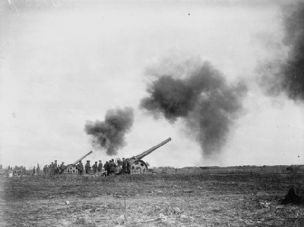Passover 5674 (1914) – 110 Years Ago
Millions of Jews throughout Europe, who sat peacefully with their families during the two seder nights of Passover 1914, had no idea what was in store for them in the coming summer.
In the summer, WWI broke out, which was a calamity for all of Europe, and in truth most of it did not recover from the war and its consequences until WWII arrived, and the terrible Holocaust – that overshadowed its predecessor (WWI) and almost erased its memory from the consciousness of humanity – occured.

Cannons thunder on the battlefield during the First World War
Indeed, World War II was an unprecedented disaster, but the tragedy of World War I and the destruction that thousands of Jewish families faced deserves to be recorded in the history of mankind in letters of “blood, fire, and columns of smoke” (from the Passover Hagada), and perhaps the fact that such a large part of the survivors of this war found their deaths in the Holocaust also contributed to the fact that not many people today are aware of the details of the war and its events, and the streams of blood that were shed during it.
Let’s read this dry statistic from Wikipedia, so that we understand the terrible effect of the war on world Jewry:
“Aproximately 1.35 million Jews fought in the armies involved in WWI. The Jews fought on both sides of the war. About 500,000 Jews served in the Russian Army; about 320,000 Jews served in the Austro-Hungarian Army; about 250,000 Jews served in the American Army; about 100,000 Jews served in the German Army; about 55,000 Jews served in the French Army; and about 50,000 Jews served in armies of the British Empire. Jews also served in other armies that participated in the campaign. The estimate of the dead among the Jewish soldiers ranges over 170,000.“
A hundred and seventy thousand Jewish soldiers were killed in the war!
And on the Passover holiday, now in the days of the war that has befallen the Holy Land, everyone’s thoughts wander to the many Jewish soldiers who gave their lives at the front, to the so many soldiers who sacrificed their lives and died for the sanctification of God’s Name, and to the thousands of heroic soldiers who were wounded, many of them who have become disabled. Now, on the eve of Passover, our thoughts wander to the 133 hostages who on Seder night last year never dreamed that this year they would spend the holiday in the depths of the earth, among evil and cruel predatory terrorists, far from their loving families, and in constant fear of death.
These thoughts bring us to the moving tune of the cantor, Yosseleh Rosenblatt z”l, a tune he composed during the First World War, when the Jewish People were torn apart by concern for the boys who fought on the various fronts, and for the countless families who were torn apart and exiled from their homes into the unknown.
Here we present the recording and words in Yiddish, followed by the English translation.
A Gebet
Mit a tzubrachenen hertz
Un mit leiden ahaneu shiur
Zog ich yetzt Tehilim, zol yeder mit mir
Veinen klogen oif dem umglick fun der milchama tzeit
Er Fervandert in mir, troyer a shrek
Er reist dem leben, fun kinder avek
Der flem fun fiyer brent es azoy veit, azoy veit
Lomir betin G-tt men zol mir zein gezunt
G-tteynu, Tattaleh, shenk unz dein blick
Breng yeden, tzu Tattaleh, gezunterheit tzurik
Very veist noch ver, vi du mer
Tzu kinder haben kumt ahen shver
Don undzer Tatteh, undzer gebet derher
Rachmanus hob, oif di elteren, oif Du bist nisht oif zei
Es is yungeh lebens, yungeh blos, oy G-tt ich bet ich vei
Zol zein shulem shoin, ven skumt in dem platz in dem
Un beshulem brengt di kinderlach aheim
(Wikibibliotek)
English translation:
With a broken heart
And with immeasurable suffering
I recite Tehilim (Psalms) now, that everyone should say with me
To cry and to lament about the destruction of the war
It (the war) is an open wound inside me, grief and fear,
She steals life, young children’s lives,
The flame of fire burns so far, so far.
Father, mother, sisters, brothers, wife and child,
Let us ask G-d for health,
Blessed G-d, Abbaleh, implore us with Your gaze (with your care)
Please bring them all home, to their parents, in return
Who knows even more than you
How hard it is to raise children?
Thus, our Father, please hear our prayer, our Father
Have mercy on the parents, and if not on them
For these are young lives, young blood, oy G-d, we beg, we ache
Let there be peace already in the world (…)
And bring the children home safely.














